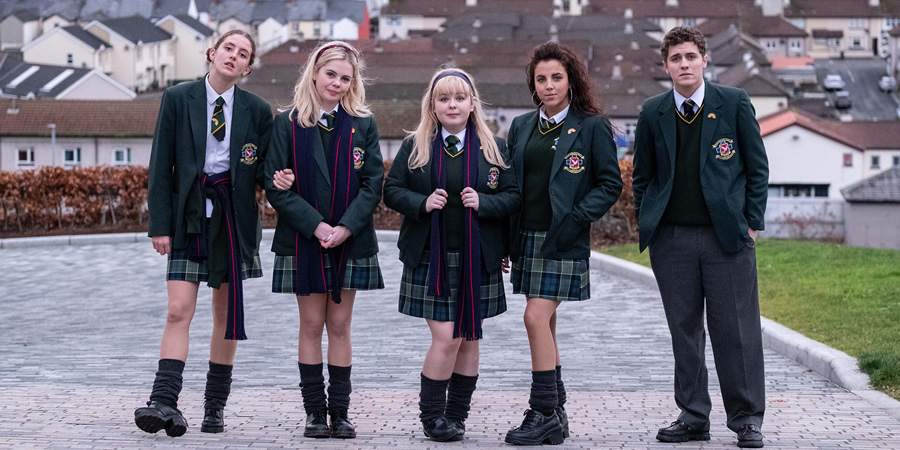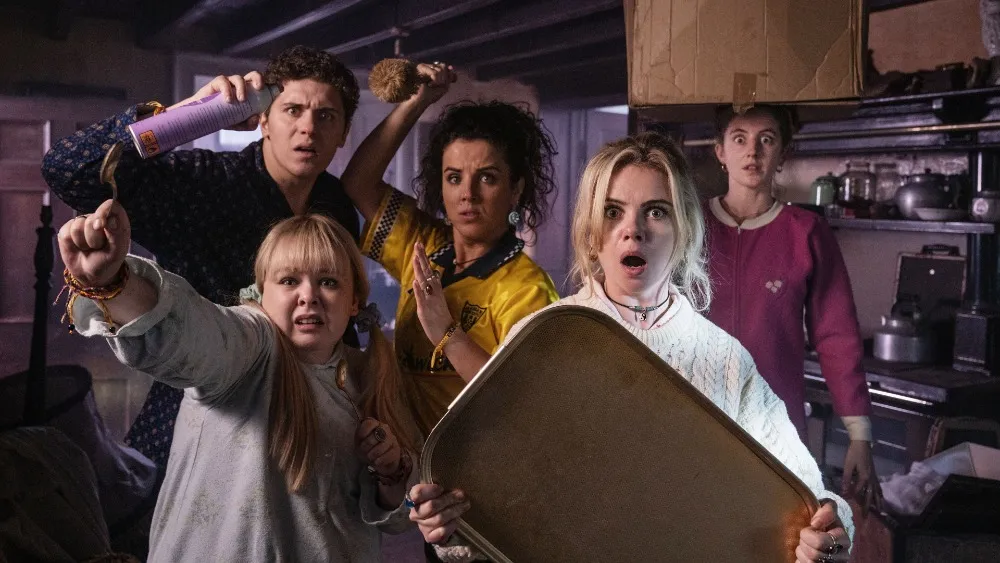By Celia Papavasileiou,
“You’re a Derry Girl now, James. It doesn’t matter that you’ve got that stupid accent or that your bits are different to my bits, because being a Derry Girl, well, it’s a state of mind.”
Nothing describes better what being a “Derry Girl” means than Michelle’s words in the show. A sitcom about what it’s like being a teenage girl (and boy) growing up in Northern Ireland during the end of the Troubles in the 1990’s. Who could have imagined that a series dealing with adolescence drama and the violence of the Troubles could become such a successful comedy?
“Derry Girls” follows the lives of a group of teenagers attending “Our Lady Immaculate College”, a Catholic girls’—until now—secondary school in Derry. Our main characters experience all the difficulties that come with being a teenager, highlighted against the backdrop of political tension in Northern Ireland.
The first episode begins with the narration of Erin Quinn (Saoirse-Monica Jackson), an aspiring writer and creative dreamer, whose diary has been stolen by her first cousin and roommate Orla (Louisa Harland). Their friend group includes other individuals like the “intellectual” Clare (Nicola Coughlan) and the party animal Michelle (Jamie-Lee O’Donnell). The gang wouldn’t be complete without Michelle’s cousin James (Dylan Llewellyn), who is the first-ever male student to join “Our lady Immaculate College” and, mainly, well—English.

The show premiered on January 4, 2018, on Channel 4 and ran for three seasons with a total of 19 episodes. It is produced by the British production company “Hat Trick Productions” and filmed in Derry and Belfast in Northern Ireland. Created and written by Lisa McGee, the series is inspired by her own life growing up in Derry during the end of the Troubles.
Each episode presents a different experience for our friend group—whether positive or negative. From attending concerts, parties, and trips to facing assignments, detention, and even death. In an interview for the Los Angeles Times, McGee highlighted that she wanted to realistically portray life in Derry during those violent times. The Troubles didn’t mean the absence of the “typical high school experience”. Sometimes pain wasn’t a result of the political tension of the times, but just a typical part of life as we all know it.
McGee always wanted to become a writer. However, she was skeptical about writing anything relating to the Troubles; it seemed boring and “gray” to her. But when she started creating the idea behind Derry Girls, she realized that it couldn’t be done right without the strong sociopolitical context of Northern Ireland.
Even in a simple—at first sight—scene in the series, the fact that our characters live during a political crisis is evident and becomes an integral part of who they are. It’s what makes them “Derry Girls”. Imagine being on the bus on your way to school and even that regular moment is suddenly interrupted by a bomb scare.
Our gang is growing up as Northern Ireland is growing up. In the final episode of the series, when our characters have turned 18, they must make the most significant decision of their lives: they must exercise their right to vote on the Good Friday Agreement.
As our characters are growing up, they live in a divided country. Since 1921, there had been a split between nationalists, who wanted Northern Ireland to be a part of the Republic of Ireland, and unionists, who supported Northern Ireland remaining in the United Kingdom. This conflict only grew stronger in the 1960s when armed groups from both sides, such as the Irish Republican Army (IRA) and the Ulster Volunteer Force (UVF), began carrying out bombings and shootings. British Troops were also sent to Northern Ireland. The Troubles lasted about 30 years and took the lives of more than 3,500 people.
The Troubles finally ended on April 10, 1998, when the Good Friday Agreement was signed. Signing the Good Friday Agreement meant that the country would remain part of the UK, but under a new government, representing both nationalists and unionists. Citizens could hold Irish or British nationality, or both if they wish.
However, part of the Agreement was that everyone involved in violence during the Troubles would be released from prison. That is the main conflict our characters have to face: are they willing to free people who took innocent lives in the name of hope? Is a brighter future really possible? Most importantly, what are they willing to sacrifice for that future?

One of the most impactful scenes in that final episode is Erin’s grandfather’s words to her when discussing about the Agreement: “What if all this becomes a ghost story you’ll tell your wains one day?”. This is what I, and many others, love about the series: it’s full of hope. Even when the characters—who, at the end of the day, are just teenagers—are faced with the hardest challenge of all (changing the future of their entire country), they are full of hope. That’s what it means to be a Derry Girl after all, isn’t it?
The series is a perfect mixture of comedy and hard decisions. I haven’t laughed as much at a series ever before, and I’m not sure I ever will again. But what I love the most about it is its hopeful spirit—what it means to be a dreamer, to be hopeful even when everything seems impossible.
Erin’s words will forever be engraved in my mind—and I hope in yours too: “There’s a part of me that wishes everything could just stay the same… But things can’t stay the same, and they shouldn’t. No matter how scary it is, we have to move on, and we have to grow up, because things, well, they might just change for the better. So we have to be brave. And if our dreams get broken along the way, we have to make new ones from the pieces.”
References
- ‘Derry Girls’ creator on the hit show bringing Northern Ireland together. LA times. Available here
- Good Friday Agreement: What is it? BBC. Available here
- How an ‘incredible’ real-life feat gave a TV show about the Troubles its happy ending. LA times. Available here
- The Troubles: What led to Northern Ireland’s conflict? BBC. Available here




